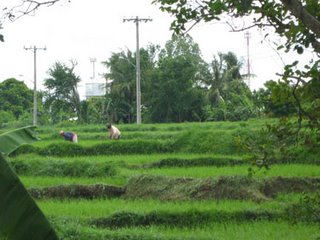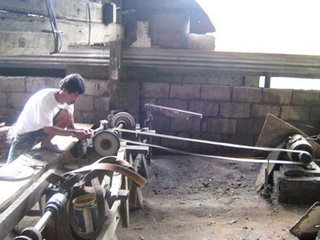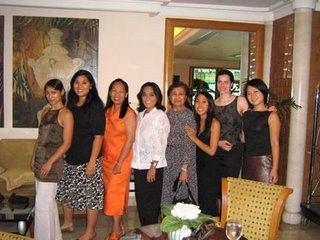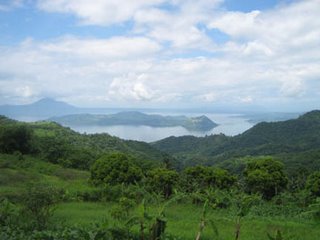So, when they said this was an "immersion" program, I assumed they were speaking figuratively. I wasn't prepared for the actual floods.
Which, probably I should have been, since my stay here corresponds pretty much exactly with the rainy season. It rains everyday, but usually only for an hour or so. Today, though, there was a real typhoon (bagyo in Filipino). Afternoon classes at De la Salle were cancelled due to flooding -- for everyone except us, of course. For part of my trip home today, I had to take a taxi along Roxas Ave., which runs along Manila Bay. The street was so flooded that water was actually seeping in the bottom of the door. For a few minutes, it looked like we weren't going to make it, but the taxi driver pulled through like a champ. Still, definitely a new experience for me. One of many, of course. I also learned a new vocabulary word -- baha is flood (which I knew) sa babahaan is a place that often gets flooded. An apt description for Manila this time of year.
I also learned a new thing to worry about. Aside from the obvious danger of disease from the filthy flood water, a much more insidious danger can lurk beneath. When the rains are strong enough, the sewers back up and the rising water from the bay can push open manhole covers, which then turn into death traps for pedestrians, completely invisible on dark, flooded streets. (It's worth noting at this point that in the Philippines, the sidewalks are for vendors and panhandlers. if you want to actually get anywhere, you walk in the street) A classmate, who grew up in the Philippines, was genuinely terrified by this possibility, so I assume that it's not just an urban legend.
Fortunately, I made it to my light-rail station without getting swept out to see. Riding the light-rail -- LRT to the locals, who have quite an affinity for abbreviations -- is also quite an experience, particularly during rush-hour. Filipinos definitely have a different concept of how many people can fit into a small space than Americans. Some of it is just size difference, but some of it is cultural as well. For example, car seats built for three Americans hold four people here, even though it means that at least one of them probably has a metal bar wedged somewhere uncomfortable. On the trains, it's absolutely incredible how many people can cram in. Fortunatly, the first few cars of every train are reserved for women only, so it's just physically uncomfortable, not emotionally.
The image here is a sea of black hair, with my head and shoulders floating on top. I am a full 10 inches taller than the average Filipino (male or female) Being tall is convenient at times, especially on the train, because I can hang on to places nobody else can reach. Unfortunatly, I also seem to injure at least one person a day, because my elbows are at eye-level for quite a lot of women, and on a crowded, jerky train it's hard not to bump into people.
I also have a lot of work to do, all the time, which I should probably be doing right now.
I also notice that my syntax has gotten a bit odd. Which is a good sign, I think, because it means I've gotten so accustomed to speaking and thinking in Filipino that it's a bit difficult to shift back to English.












